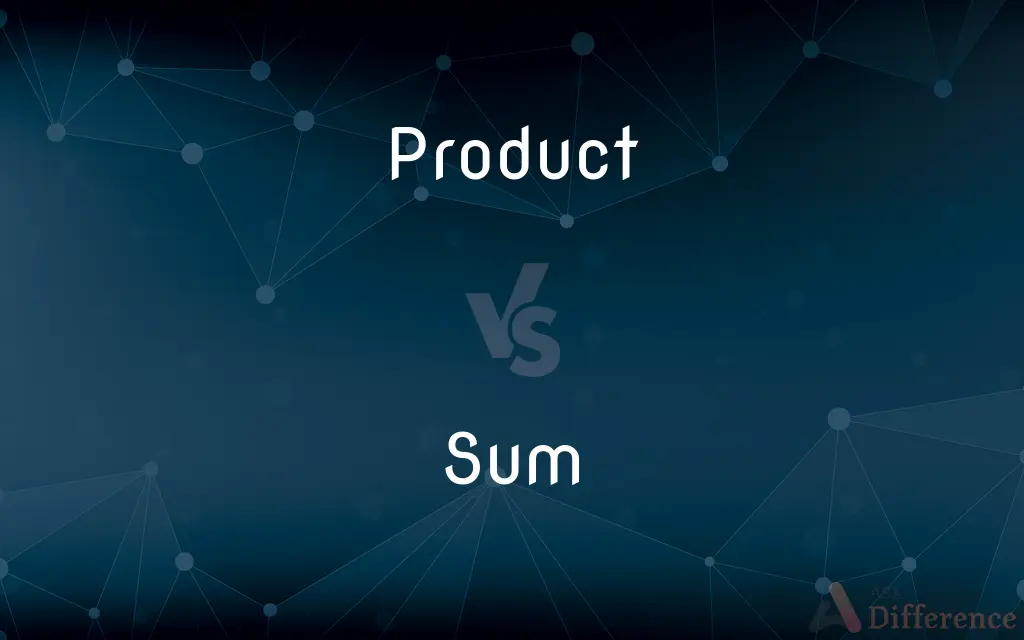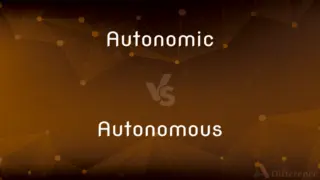Product vs. Sum — What's the Difference?
Edited by Tayyaba Rehman — By Maham Liaqat — Updated on March 20, 2024
Product is the result of multiplying numbers, while sum is the result of adding them.

Difference Between Product and Sum
Table of Contents
ADVERTISEMENT
Key Differences
Product and sum are two fundamental concepts in mathematics, each representing a basic arithmetic operation with distinct outcomes and applications. On the other hand, the sum is the result of adding two or more numbers, reflecting the total amount when numbers are combined. For instance, the sum of 3 and 4 is 7, representing the combined total of these numbers.
While the product provides insight into repeated addition or the scaling of quantities, the sum offers a way to aggregate or accumulate quantities. Products are essential in areas such as geometry, for calculating areas and volumes, where dimensions are multiplied to find the size of two-dimensional or three-dimensional shapes. Sums, however, are crucial in scenarios requiring aggregation, such as totaling scores, counts, or financial balances.
The concept of product extends beyond simple multiplication to include more complex mathematical constructs such as dot products in vector mathematics and matrix multiplication in linear algebra. These applications demonstrate the versatility and foundational nature of multiplication in structuring and understanding various mathematical and physical phenomena. Conversely, sums play a critical role in statistical analysis, calculus (through integration), and in the formulation of various mathematical series and sequences, showcasing their importance in accumulation processes and in the analysis of trends and patterns.
Understanding the difference between product and sum is crucial not only for basic arithmetic operations but also for their applications in more advanced mathematical concepts. The product is indicative of growth or scaling, often used to model situations where quantities increase exponentially or in proportion to each other. The sum, however, is indicative of accumulation or aggregation, used to model situations where quantities are combined or collected together.
Both product and sum are foundational in the development of mathematical theory and practice, each playing a unique role in arithmetic calculations, algebra, geometry, calculus, and beyond. Their applications span a wide range of scientific, engineering, economic, and statistical fields, illustrating the broad utility and significance of these basic operations in various contexts.
ADVERTISEMENT
Comparison Chart
Operation
Multiplication
Addition
Result
Total when numbers are taken multiple times
Total when numbers are combined
Symbol
× or *
+
Example
3 × 4 = 12
3 + 4 = 7
Applications
Areas, volumes, scaling
Aggregating scores, financial totals
Compare with Definitions
Product
Fundamental in geometry and algebra.
Matrix multiplication involves finding the product of matrices.
Sum
Essential in financial calculations.
Net income is the sum of all revenues minus expenses.
Product
Used in various mathematical and physical concepts.
The dot product in vector math quantifies vector similarities.
Sum
The result of adding numbers together.
The sum of 4 and 5 is 9.
Product
The result of multiplying numbers together.
The product of 2 and 3 is 6.
Sum
Represents combined quantities or totals.
The sum of angles in a triangle is 180 degrees.
Product
Indicates how quantities increase proportionally.
Population growth can be modeled by the product of rate and initial size.
Sum
Reflects aggregation or total accumulation.
The total cost is the sum of individual prices.
Product
Reflects scaling or repeated addition.
The area of a rectangle is the product of its length and width.
Sum
Crucial in statistical analysis and calculus.
Summation is used to find areas under curves.
Product
An item that is made or refined and marketed
Farm products.
Soaps, detergents, and similar products.
Travel products such as vacation trips.
Sum
An amount obtained as a result of adding numbers.
Product
Such items considered as a group
Sold a lot of product in May.
Sum
An arithmetic problem
A child good at sums.
Product
A preparation, such as a gel, used for styling hair
Began to use product soon after he became famous.
Sum
The whole amount, quantity, or number; an aggregate
The sum of the team's combined experience.
Product
A substance resulting from a chemical or nuclear reaction.
Sum
An amount of money
Paid an enormous sum.
Product
A direct result; a consequence
"Is history the product of impersonal social and economic forces?" (Anthony Lewis).
Sum
A summary
My view of the world, in sum.
Product
A person whose characteristics or abilities are the result of certain influences or kinds of experience
"She is the product of an America in which explicit displays of pride in intellect are considered unseemly" (Yuval Levin).
Sum
The central idea or point; the gist.
Product
The number or quantity obtained by multiplying two or more numbers together.
Sum
(Mathematics) To add.
Product
A scalar product.
Sum
To give a summary of; summarize.
Product
A vector product.
Sum
A quantity obtained by addition or aggregation.
The sum of 3 and 4 is 7.
Product
Anything that is produced; a result.
The product of last month's quality standards committee is quite good, even though the process was flawed.
Sum
(often plural) An arithmetic computation, especially one posed to a student as an exercise (not necessarily limited to addition).
We're learning about division, and the sums are tricky.
Product
The amount of an artifact that has been created by someone or some process.
They improve their product every year; they export most of their agricultural production.
Sum
A quantity of money.
A tidy sum
The sum of forty pounds
Product
A consequence of someone's efforts or of a particular set of circumstances.
Skill is the product of hours of practice.
His reaction was the product of hunger and fatigue.
Sum
A summary; the principal points or thoughts when viewed together; the amount; the substance; compendium.
This is the sum of all the evidence in the case.
This is the sum and substance of his objections.
Product
(chemistry) A chemical substance formed as a result of a chemical reaction.
This is a product of lime and nitric acid.
Sum
A central idea or point; gist.
Product
(arithmetic) A quantity obtained by multiplication of two or more numbers.
The product of 2 and 3 is 6.
The product of 2, 3, and 4 is 24.
Sum
The utmost degree.
Product
(mathematics) Any operation or a result thereof which generalises multiplication of numbers, like the multiplicative operation in a ring, product of types or a categorical product.
Sum
(obsolete) An old English measure of corn equal to the quarter.
Product
Any tangible or intangible good or service that is a result of a process and that is intended for delivery to a customer or end user.
Sum
The basic unit of money in Kyrgyzstan.
Product
A commodity offered for sale.
That store offers a variety of products.
We've got to sell a lot of product by the end of the month.
Sum
The basic unit of money in Uzbekistan.
Product
Any preparation to be applied to the hair, skin, nails, etc.
Wash excess product out of your hair.
Sum
A type of administrative district used in China, Mongolia, and Russia. In Mongolia, a sum is smaller than a province. In China, it is only used in Inner Mongolia, where it is equivalent to a township.
Product
Illegal drugs, especially cocaine, when viewed as a commodity.
I got some product here – you buying?
Sum
(transitive) To add together.
Product
To produce.
Sum
(transitive) To give a summary of.
Product
Anything that is produced, whether as the result of generation, growth, labor, or thought, or by the operation of involuntary causes; as, the products of the season, or of the farm; the products of manufactures; the products of the brain.
There are the productOf those ill-mated marriages.
These institutions are the products of enthusiasm.
Sum
Eye dialect of some
Product
The number or sum obtained by adding one number or quantity to itself as many times as there are units in another number; the number resulting from the multiplication of two or more numbers; as, the product of the multiplication of 7 by 5 is 35. In general, the result of any kind of multiplication. See the Note under Multiplication.
Sum
Eye dialect of some
Product
To produce; to bring forward.
Sum
The aggregate of two or more numbers, magnitudes, quantities, or particulars; the amount or whole of any number of individuals or particulars added together; as, the sum of 5 and 7 is 12.
Take ye the sum of all the congregation.
Product
To lengthen out; to extend.
He that doth much . . . products his mortality.
Sum
A quantity of money or currency; any amount, indefinitely; as, a sum of money; a small sum, or a large sum.
With a great sum obtained I this freedom.
Product
To produce; to make.
Sum
The principal points or thoughts when viewed together; the amount; the substance; compendium; as, this is the sum of all the evidence in the case; this is the sum and substance of his objections.
Product
Commodities offered for sale;
Good business depends on having good merchandise
That store offers a variety of products
Sum
Height; completion; utmost degree.
Thus have I told thee all my state, and broughtMy story to the sum of earthly bliss.
Product
An artifact that has been created by someone or some process;
They improve their product every year
They export most of their agricultural production
Sum
A problem to be solved, or an example to be wrought out.
A sum in arithmetic wherein a flaw discovered at a particular point is ipso facto fatal to the whole.
A large sheet of paper . . . covered with long sums.
Product
A consequence of someone's efforts or of a particular set of circumstances;
Skill is the product of hours of practice
His reaction was the product of hunger and fatigue
Sum
To bring together into one whole; to collect into one amount; to cast up, as a column of figures; to ascertain the totality of; - usually with up.
The mind doth value every moment, and then the hour doth rather sum up the moments, than divide the day.
Product
A chemical substance formed as a result of a chemical reaction;
A product of lime and nitric acid
Sum
To bring or collect into a small compass; to comprise in a few words; to condense; - usually with up.
"Go to the ant, thou sluggard," in few words sums up the moral of this fable.
He sums their virtues in himself alone.
Product
A quantity obtained by multiplication;
The product of 2 and 3 is 6
Sum
To have (the feathers) full grown; to furnish with complete, or full-grown, plumage.
But feathered soon and fledgeThey summed their pens [wings].
Product
The set of elements common to two or more sets;
The set of red hats is the intersection of the set of hats and the set of red things
Sum
A quantity of money;
He borrowed a large sum
The amount he had in cash was insufficient
Sum
A quantity obtained by addition
Sum
The final aggregate;
The sum of all our troubles did not equal the misery they suffered
Sum
The choicest or most essential or most vital part of some idea or experience;
The gist of the prosecutor's argument
The heart and soul of the Republican Party
The nub of the story
Sum
The whole amount
Sum
The basic unit of money in Uzbekistan
Sum
A set containing all and only the members of two or more given sets;
Let C be the union of the sets A and B
Sum
Be a summary of;
The abstract summarizes the main ideas in the paper
Sum
Determine the sum of;
Add all the people in this town to those of the neighboring town
Common Curiosities
Can the product and sum of the same numbers be equal?
Yes, particularly when dealing with the numbers 2 and 2 (2+2=4 and 2×2=4), but this is a unique case.
Why is understanding products and sums important?
They are foundational for basic arithmetic, critical in advanced mathematics, and essential for practical applications in various fields.
Are there digital tools to calculate sums and products?
Yes, numerous digital calculators and software programs can perform these operations, from basic to complex.
What is a product in mathematics?
A product is the result of multiplying two or more numbers together, representing repeated addition.
How do products apply in geometry?
Products are used to calculate areas, volumes, and other geometric properties requiring dimensional scaling.
What is a sum?
A sum is the total result of adding two or more numbers, reflecting the combined total of these quantities.
How does calculus use sums?
Calculus uses sums extensively in integration, where the area under a curve is approximated by summing infinitesimally small quantities.
How do product and sum differ?
The product is obtained through multiplication and indicates scaling, while the sum results from addition and signifies accumulation.
What symbols are used for product and sum?
The multiplication sign (× or *) is used for product, and the plus sign (+) for sum.
Where do sums find application?
Sums are used in aggregating values, in statistical analysis, and in calculating total effects or quantities.
What is an example of a product in real life?
Calculating the total cost of identical items bought in bulk (price per item × quantity).
How does understanding sums and products benefit students?
It enhances problem-solving skills, aids in understanding more complex mathematical concepts, and applies to real-world scenarios.
Can the sum be negative?
Yes, if the numbers being added include negative values, the sum can be negative.
What mathematical fields rely heavily on products?
Algebra, geometry, and physics, among others, rely on products for scaling and transformations.
Is there a product in sequence or series?
Yes, products can be found in sequences or series, especially in geometric sequences where each term is the product of the previous term and a constant ratio.
Share Your Discovery

Previous Comparison
Autonomic vs. Autonomous
Next Comparison
Confederate vs. UnionAuthor Spotlight
Written by
Maham LiaqatEdited by
Tayyaba RehmanTayyaba Rehman is a distinguished writer, currently serving as a primary contributor to askdifference.com. As a researcher in semantics and etymology, Tayyaba's passion for the complexity of languages and their distinctions has found a perfect home on the platform. Tayyaba delves into the intricacies of language, distinguishing between commonly confused words and phrases, thereby providing clarity for readers worldwide.













































